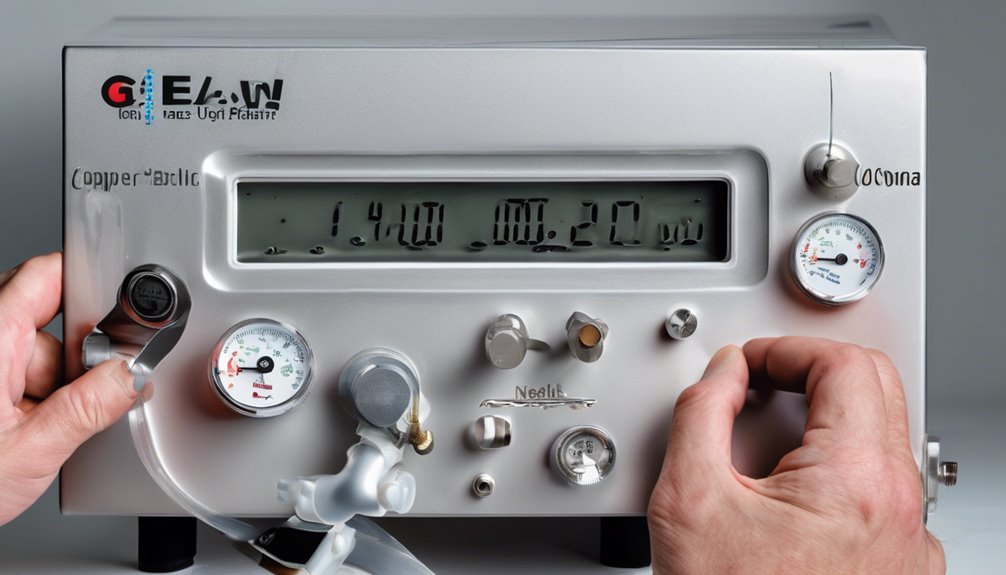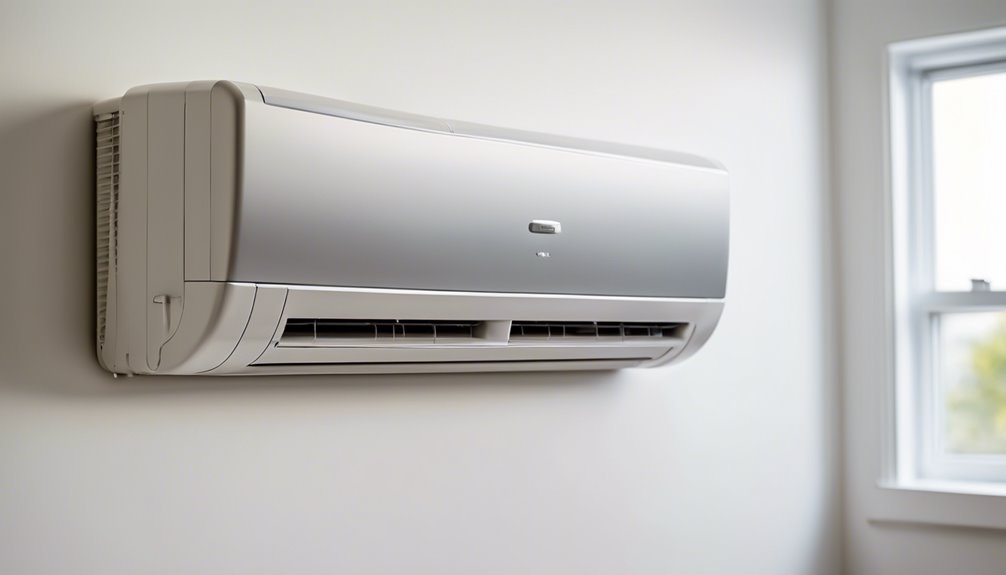When buying a new air conditioner or already owning one, you're likely thinking about protecting your investment with a warranty and insurance services. Warranties, usually 5-10 years, cover defects and malfunctions, while insurance services, offered by third-party providers, cover accidents and natural disasters. Investing in both can extend the equipment's lifespan, provide financial risk protection, and give you peace of mind. To make the most of these services, you'll want to research providers, understand what's covered, and follow maintenance requirements – and we'll explore these essential details further.
Key Takeaways
- AC warranties vary in duration, typically lasting 5-10 years, and may be extended for an additional fee.
- Warranties and insurance services differ in coverage, cost, and duration, with warranties focusing on defects and malfunctions.
- Investing in AC warranty and insurance can extend equipment lifespan, provide financial risk protection, and offer peace of mind.
- When choosing a provider, research their ratings, reviews, and expertise in AC warranty and insurance, as well as types of coverage offered.
- Carefully review policy details, including exclusions, limitations, and requirements for maintenance and repairs to maximize warranty and insurance coverage.
Understanding AC Warranty Options
When purchasing an air conditioner, understanding the warranty options available is crucial to ensure you're protected in case something goes wrong.
You need to know what's covered, for how long, and what kind of manufacturer support you can expect. Warranty duration varies by brand and model, but most ACs come with a standard warranty that lasts between 5 to 10 years.
Some manufacturers offer extended warranties for an additional fee. Look for brands that provide comprehensive support, including dedicated customer service, online resources, and authorized repair technicians.
A good warranty can save you money and hassle in the long run, so don't skip this important step in your purchasing decision.
How Insurance Services Differ From Warranties
While you're likely familiar with the concept of a warranty, you might be less clear on how insurance services differ from these manufacturer-provided protections. One key distinction lies in the provider: warranties come from the manufacturer or seller, whereas insurance services are offered by third-party Service Providers. This difference affects the scope of coverage, with warranties typically focusing on defects and malfunctions, and insurance services covering accidents, natural disasters, and other unforeseen events.
| Warranties | Insurance Services | Key Differences |
|---|---|---|
| Manufacturer-provided | Third-party provider | Coverage scope and provider |
| Defects and malfunctions | Accidents, natural disasters | Types of events covered |
| Limited to product lifespan | Renewable or ongoing coverage | Duration of coverage |
| Free or low-cost | Premiums required | Cost to you |
| Limited to product only | Additional benefits (e.g., 24/7 support) | Additional perks |
Benefits of Investing in AC Warranty and Insurance
By investing in AC warranty and insurance, you'll enjoy an extended equipment lifespan, as regular maintenance and repairs will keep your AC unit running smoothly for years to come.
You'll also get financial risk protection, which means you won't have to break the bank when unexpected repairs or replacements arise. This combination of benefits will give you peace of mind and help you budget more effectively.
Extended Equipment Lifespan
An air conditioner is a significant investment, and extending its lifespan can lead to substantial cost savings and reduced environmental impact.
By investing in an AC warranty and insurance, you can ensure regular equipment maintenance, which is crucial in preventing breakdowns and prolonging its lifespan.
This maintenance not only saves you from frequent repair costs but also helps maintain the unit's efficiency, reducing your energy bills.
With extended equipment lifespan, you'll enjoy cost savings in the long run. Moreover, a well-maintained AC unit consumes less energy, contributing to a reduced carbon footprint.
Financial Risk Protection
You've invested in an air conditioner to ensure a comfortable living space, but what about protecting yourself from the financial burden of unexpected repairs or replacements?
Investing in an AC warranty and insurance provides financial risk protection, giving you peace of mind and financial security.
This investment is a crucial aspect of risk management, as it shields you from unforeseen expenses that can disrupt your budget.
- Reduces financial stress and anxiety
- Covers costly repairs or replacements
- Protects your savings from unexpected expenses
- Provides financial stability and security
Factors to Consider When Choosing a Provider
When selecting a provider for your AC warranty and insurance, it's crucial to consider several key factors to ensure you're getting the best coverage for your needs. You want a provider that's reliable, trustworthy, and has a strong industry reputation.
| Factor | Description | Why it Matters |
|---|---|---|
| Provider Reputation | Research the provider's ratings, reviews, and testimonials | A reputable provider is more likely to honor claims and provide quality service |
| Industry Experience | Check how long the provider has been in business and their expertise in AC warranty and insurance | An experienced provider understands the industry and can offer tailored solutions |
| Coverage Options | Review the types of coverage offered, including extended warranties and maintenance plans | You want a provider that offers flexible coverage options to fit your needs |
| Customer Support | Evaluate the provider's customer support, including availability and response times | Good customer support ensures you get help when you need it |
What's Covered Under AC Warranty and Insurance Policies
Your air conditioning system is a significant investment, and having the right warranty and insurance coverage can provide peace of mind and protect your budget from unexpected repair costs.
When reviewing your policies, consider what's covered and what's not.
Typically, warranties and insurance policies cover:
- Parts and labor costs for repairs and replacements
- Failure of system components, such as compressors, coils, and fans
- Issues related to manufacturer reliability, including defects and malfunctions
- Cost considerations, such as travel fees, diagnostics, and emergency service calls
Understanding what's covered under your warranty and insurance policies can help you budget for maintenance and repairs, and ensure you're not caught off guard by unexpected expenses.
Tips for Maximizing Your Warranty and Insurance Coverage
When you're trying to maximize your warranty and insurance coverage, you'll want to carefully review your policy to understand what's included and what's not.
You should also pay close attention to the fine print, as it can reveal exclusions or limitations that might surprise you down the line.
Understand Policy Fine Print
What's hidden in the fine print of your AC warranty and insurance policy can make all the difference in maximizing your coverage.
When you take the time to analyze the fine print, you'll uncover policy loopholes that could leave you high and dry.
To avoid this, make sure you:
- Read between the lines to identify exclusions and limitations
- Look for clauses that may void your warranty or insurance
- Check for specific requirements for maintenance and repairs
- Verify the process for filing claims and getting reimbursed
Avoid Unnecessary Exclusions
To maximize your AC warranty and insurance coverage, it's crucial to avoid unnecessary exclusions that can leave you with unexpected repair or replacement costs.
When reviewing your policy, pay close attention to exclusion clauses that may limit your coverage. These clauses can be hidden in policy loopholes, making it essential to understand what's not covered.
For instance, some warranties may exclude coverage for certain parts or repairs due to wear and tear. By being aware of these exclusions, you can take proactive steps to maintain your AC unit and avoid costly surprises.
Don't assume you're fully covered – carefully review your policy to ensure you're not caught off guard by unexpected expenses.
Frequently Asked Questions
Can I Purchase an AC Warranty From a Third-Party Provider?
You can buy extended coverage from third-party providers, which often offer more flexible plans and competitive pricing than manufacturers. These third-party benefits can provide you with added peace of mind and financial protection.
What Is the Average Cost of AC Warranty and Insurance Services?
When buying a warranty, you'll find the average cost varies based on cost factors like appliance age, type, and coverage level. Typically, you'll pay between $100 to $500 per year, depending on policy benefits, which can include repair, replacement, and maintenance services.
Do All AC Manufacturers Offer Warranty and Insurance Options?
You'll find that not all manufacturers offer warranty and insurance options, as it depends on manufacturer standards and industry norms. In the AC industry, some brands provide these services, while others may partner with third-party providers or leave it to retailers.
Can I Cancel My AC Warranty and Insurance Policy at Any Time?
You can usually cancel your policy, but you'll need to review the terms to see if there are policy restrictions or cancellation fees involved, which might affect your decision to terminate your contract at any time.
Are AC Warranty and Insurance Services Available for Commercial Properties?
You're wondering if commercial properties can get warranty and insurance services. Yes, they can! You can get commercial coverage that provides business protection, safeguarding your investment and ensuring uninterrupted operations.
Conclusion
You've got the lowdown on AC warranty and insurance services. Now it's time to take action! Don't let unexpected repairs or replacements drain your wallet. Invest in a comprehensive warranty and insurance plan that provides financial protection and peace of mind. By doing so, you'll ensure your AC system runs smoothly and efficiently, and you'll be prepared for any unexpected issues that may arise.

